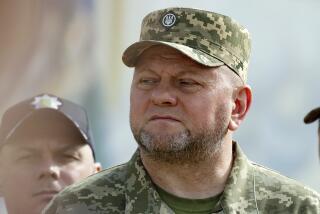Gorbachev Fires Restive Armyâs Chief of Staff : Soviet Union: With discontent growing in military, a conservative is replaced by a general who resisted coup.
MOSCOW â With discontent in the Soviet army swelling ominously, President Mikhail S. Gorbachev fired its conservative chief of staff on Saturday and replaced him with a general known for his resistance to Augustâs right-wing coup attempt.
The outgoing chief of staff, Army Gen. Vladimir Lobov, had energetically promoted military reform since he was appointed in August, overseeing plans to trim the 4-million-strong armed forces and deploy them more defensively.
But in recent weeks, signals of distress and growing fury in the armed forces have multiplied, reaching such a point that one of Lobovâs top officers complained publicly last Monday that the army is âtired of defending a country that no longer existsâ and demanded âharsh measures.â
Similar statements recently have fueled growing fears that if the countryâs chaos spawns another coup attempt, the army would support it. Gorbachev himself has speculated that âsomeone from the military-industrial complexâ could be hatching a new takeover plot.
A member of Gorbachevâs staff told the Russian Information Agency that Lobov, for all his talk of reform, âis known for his rather conservative views, and his activity no longer fits into the current transformation of the armed forces.â
The new chief of staff, Col. Gen. Victor Samsonov, 50, is also considered to be a relative conservative, but he distinguished himself in his former post as commander of the Leningrad (now St. Petersburg) Military District by refusing orders from the short-lived August junta to send his troops and tanks against the people who took to the streets in protest.
The cityâs politicians contend that it was mainly their pressure that made Samsonov hold back his troops, but the generalâs restraint and willingness to defy the countryâs purported new leaders undeniably proved to be one of the factors that unraveled the Aug. 19-21 coup attempt.
Samsonov takes over the General Staff at a time when the future of the Soviet armed forces has never been more in doubt.
With the country splitting apart, Gorbachev has called repeatedly for the army to remain unified, but that appears less and less likely as each Soviet republic that declares its independence also announces that it will create its own military establishment, from civil guards in the Caucasus region to Ukraineâs plans for a 400,000-strong fighting force.
The absconding republics are also balking at requests to continue financing the massive Soviet military machine.
If, as expected, the Russian Federation ends up being the armyâs only source of money, it will impose gigantic cuts on the military budget.
Yegor Gaidar, chief of the Russian Federationâs economy, has said that the government should aim for reducing the defense burden--the portion of the countryâs gross national product that goes to the military--by half next year.
Harley Balzer, director of Russian Area Studies at Georgetown University, said in Washington on Saturday that he found it hard to understand why Samsonov would be willing to take over a Soviet institution that is so clearly about to become defunct.
âItâs amazing that anyone would want to go to work for Gorbachev at this point,â Balzer said.
Col. Sergei Yushenkov, a Russian lawmaker, said that he believes Gorbachev now has too little power to make such a key staff change himself and that probably Russian Federation leaders had made the decision to fire Lobov and replace him with Samsonov.
Yushenkov questioned the presidential staffâs claims that Lobov was sacked for being too conservative. More likely, he said, amid the tricky intrigues and all-important patronage networks of the General Staff, âLobov, intelligent as he is, couldnât suit the military leadershipâ and also managed to alienate Russian leaders.
In another sign of the dangerous currents growing in the army, a military band accompanied a march here Saturday by ultra-conservatives demanding the release of the coup plotters.
Samsonov, according to St. Petersburg Police Chief Arkady Kramerevâs account of the coup period, at first leaned toward deploying his troops to stop the mass protests in the city. But in the end, Kramerev said last September, âhe said that if the situation got out of control, he would rather shoot himself than give an order to shoot people.â
Samsonov also emerged clean from his involvement in the 1989 clash between Soviet troops and peaceful protesters in the Georgian capital of Tbilisi, even though he was commander of the Caucasus Military District at the time. Nineteen protesters were killed in that clash by soldiers who charged with shovels, clubs and gas.
In that incident as well, according to reports, Samsonov refused to sanction an attack on civilians.
Lobovâs removal came just a day after he had outlined the Soviet armyâs plans for major reforms at a private think tank in London during a visit to England.
He told the Royal Institute of International Affairs that the armyâs deployment will soon have a âpurely defensive characterâ and that in the last three years, the Soviet Union has cut its production of strategic missiles by 40%, armored fighting vehicles by 80% and combat aircraft by 50%.
A General Staff indiscretion that may have contributed to his dismissal came to light in a recent interview in the newspaper Komosmolskaya Pravda. Maj. Gen. Leonid Kozhendayev, head of a General Staff department, complained about âdefending a country that no longer existsâ and described a desperate, furious mood among the nationâs officer corps.
âThe officers of the General Staff, getting their information from various sources, understand the situation better than most in this country,â he told the newspaper. âWe see the U.S.S.R. is entering a phase of active civil war. Today is the last chance to stop on the edge of the abyss.â
Times staff writer Sara Fritz in Washington and Sergei Loiko, a reporter in the Moscow bureau, contributed to this story.
More to Read
Sign up for Essential California
The most important California stories and recommendations in your inbox every morning.
You may occasionally receive promotional content from the Los Angeles Times.










